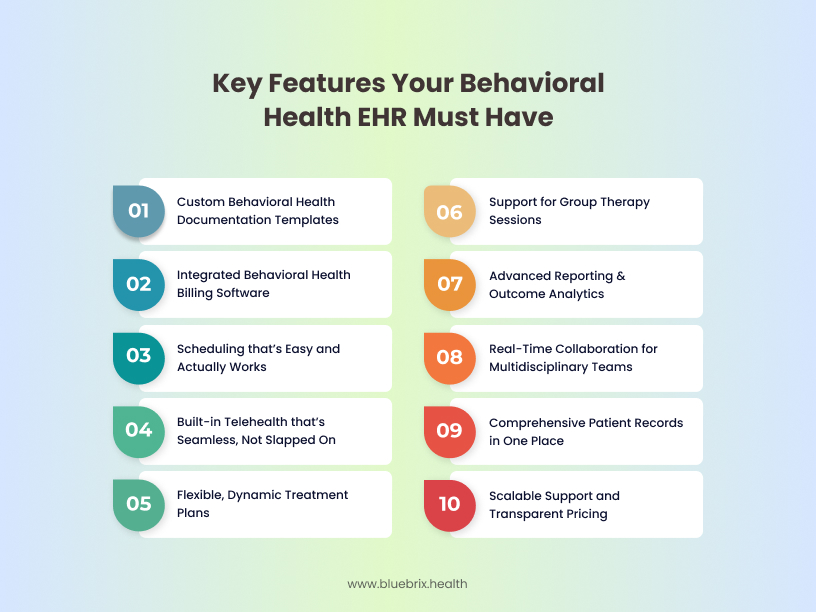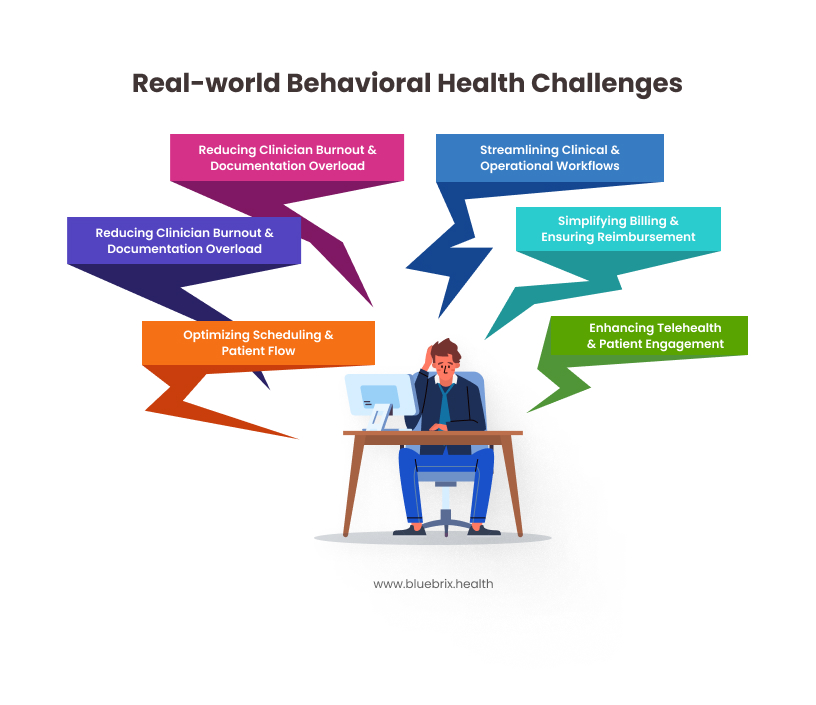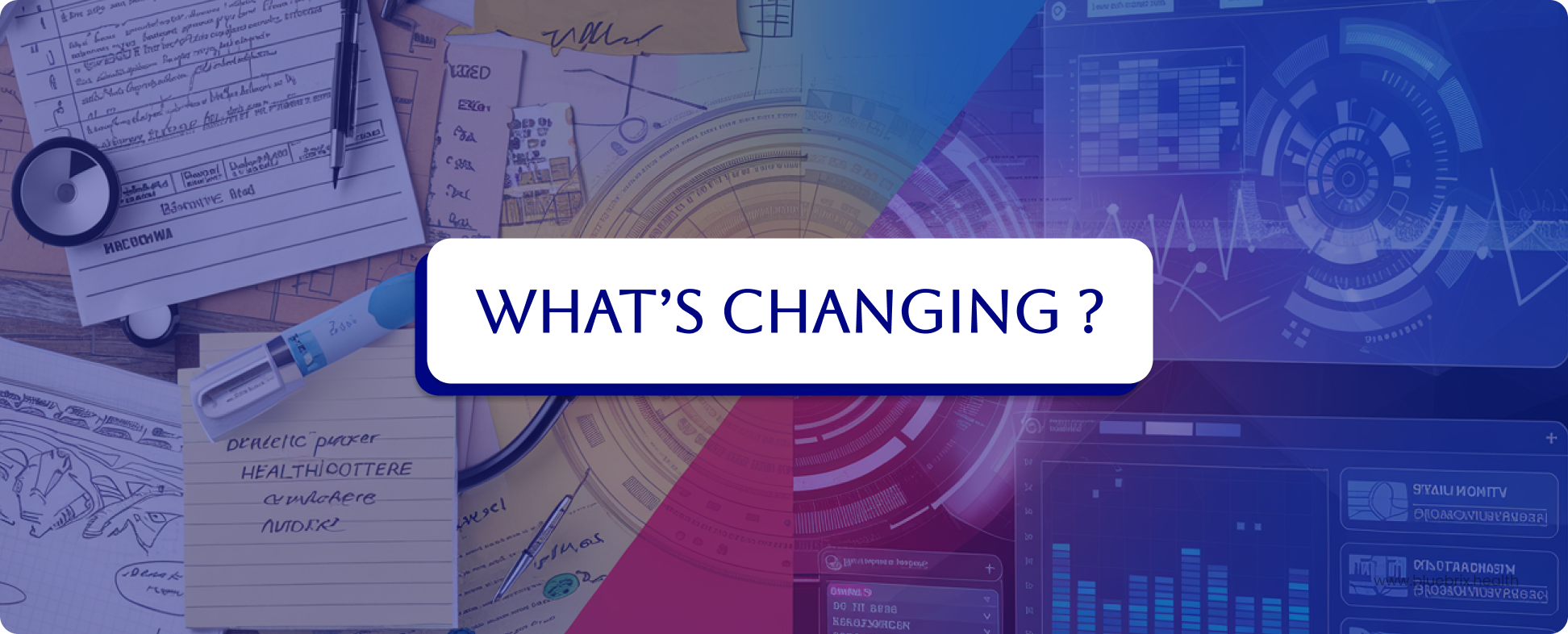If you run an outpatient behavioral health clinic, you already know this: a one-size-fits-all EHR just doesn’t cut it. Your needs are unique—more nuanced, more layered, and a lot more patient-centered than the average primary care setting. You’re not just managing vitals and prescriptions—you’re coordinating care across therapists, psychiatrists, and case managers. You’re navigating complex documentation, compliance landmines, and a growing demand for mental health services.
So let’s be clear: you don’t need just an EHR—you need a Behavioral Health EHR designed specifically for the world you operate in.
Why a Purpose-built Behavioral Health EHR Isn’t Optional Anymore
Standard EHRs force behavioral health providers into workarounds—clunky templates, rigid scheduling systems, and poor integration with billing tools. That leads to inefficiencies, frustrated clinicians, and, ultimately, compromised care. With growing caseloads and increased regulatory scrutiny, there’s no room for error—or outdated tech.
A purpose-built behavioral health EHR gives you the edge. We’re talking:
- Streamlined documentation for therapy and psych notes
- Integrated Behavioral Health Billing Software that handles complex codes and authorizations
- Smart scheduling tools that adapt to your workflow, not the other way around
Let’s break down what that really means and the must-have features you should prioritize when choosing your next system.
10 Key Features Your Behavioral Health EHR Must Have

Unlike general EHRs, behavioral health practices require specialized features that support the complexities of mental health treatment, including therapy notes, group sessions, and compliance with privacy regulations. The system you select will directly impact how efficiently your team operates, how smoothly you coordinate care, and ultimately, how well you serve your patients. So, picking the right features during the evaluation process is critical.
1. Custom Behavioral Health Documentation Templates
Generic templates waste time and dilute care. Look for an EHR that includes pre-built, customizable templates specific to behavioral health—like SOAP notes, mental status exams, risk assessments, and treatment plans.
Why it matters: Faster documentation, more consistent charting, and built-in compliance.
2. Integrated Behavioral Health Billing Software
Billing in mental health is a beast—think multiple CPT codes per session, prior auth requirements, and nuanced payer rules. You need an EHR with a robust billing engine built specifically for behavioral health.
Look for:
- Automatic claims generation for individual and group sessions
- Eligibility verification and denial tracking
- Revenue cycle management with audit-ready reporting
Why it matters: Less revenue leakage. Fewer denials. More cash flow.
3. Scheduling that’s Easy and Actually Works
No-shows. Double bookings. Inconsistent follow-ups. Scheduling is more than just filling calendar slots—it’s patient engagement strategy. A solid EHR should offer behavioral health-specific scheduling options including recurring sessions, group therapy, telehealth, and multi-provider appointments.
4. Built-in Telehealth that’s Seamless, Not Slapped On
Telehealth is here to stay—and it needs to be natively integrated into your EHR. No third-party plugins, no awkward toggles.
Why it matters: Secure virtual visits, encrypted messaging, and real-time access to patient data—all without switching tabs.
5. Flexible, Dynamic Treatment Plans
Each patient’s journey is different. Your EHR should allow you to build adaptive, personalized treatment plans that evolve over time. Goals, interventions, and progress tracking should be easily customizable.
Why it matters: True person-centered care, backed by data.
6. Support for Group Therapy Sessions
Running group sessions shouldn’t mean duplicating records or billing chaos. Choose a system that streamlines scheduling, notes, and billing for group therapy.
Why it matters: Efficient workflows, accurate documentation, and hassle-free billing for every participant.
7. Advanced Reporting & Outcome Analytics
You can’t improve what you can’t measure. Your EHR should offer dashboards and analytics to track outcomes, utilization, productivity, and compliance.
Why it matters: Smarter decisions, stronger grant proposals, and performance-based reimbursements.
8. Real-Time Collaboration for Multidisciplinary Teams
Psychiatrists, therapists, case managers—they all need access to the same record, at the same time. Look for shared notes, secure messaging, and collaborative care planning.
Why it matters: Reduced errors, better coordination, and a unified care experience.
9. Comprehensive Patient Records in One Place
Mental health doesn’t operate in silos. Your EHR should unify medical history, medications, lab results, and behavioral health notes into a single view.
Why it matters: One record. One source of truth. Zero fragmentation.
10. Scalable Support and Transparent Pricing
Even the best EHR will fall flat without the right support. Look for vendors who provide hands-on onboarding, responsive customer service, and pricing that doesn’t nickel-and-dime you with hidden fees.
Why it matters: Smoother implementation, happier teams, and predictable costs.
Beyond Features: Solving Real-World Behavioral Health Challenges

At blueBriX, we’ve walked in your shoes. Our behavioral health EHR is built to tackle real challenges faced by clinics every day:
Clinician Burnout
Automated documentation tools and AI-powered note suggestions mean your team spends more time with patients—and less with paperwork.
Inefficient Workflows
From intake to discharge, our EHR connects clinical, administrative, and billing processes into one seamless flow.
Scheduling Bottlenecks
Our intelligent scheduling tools reduce no-shows, optimize capacity, and allow patients to self-book or reschedule online.
Billing Chaos
Our all-in-one billing module handles coding, claims, denials, and remits—so you get paid faster, with fewer headaches.
Telehealth Disruptions
Whether care is in-person or virtual, blueBriX ensures a consistent experience. Integrated telehealth sessions, documentation, and billing all happen in the same system—no app-switching, no duplicate entries.
Documentation Overload
Behavioral health documentation doesn’t have to be time-consuming. With customizable templates, DSM-5 coding support, and automated treatment plans, we simplify documentation while maintaining clinical accuracy.
Data Silos
Our integrated platform allows real-time collaboration between providers and instant access to a patient’s full care history.
Reimbursement Uncertainty
Mental health coding is complex—but we make it easier. Our claims engine supports mental health-specific codes, real-time eligibility checks, and automated denial resolution, helping you protect your revenue.
Compliance Worries
HIPAA compliance and mental health documentation standards are built right into our platform. Secure storage, audit trails, and automated compliance alerts give you peace of mind.
Disconnected Patient Engagement
blueBriX puts patients at the center with self-service portals, appointment reminders, digital forms, and feedback tools. Engaged patients show up, follow through, and feel heard.
Value-Based Care Readiness
We make value-based care more manageable with built-in outcome tracking, benchmark reporting, and performance dashboards—so you can meet payer requirements without drowning in spreadsheets.





